- Home
- Wendell Berry
Imagination in Place Page 4
Imagination in Place Read online
Page 4
And yet the problem I began with has never been resolved: How do we equilibrate or even negotiate between local identity and the abstractions of regional or national identity with the attendant clichés of “economic growth”? Obviously there can be no general answer to this question. If we see the need for an answer, then we must attempt it for ourselves in our communities. I believe that there is hope in the increasing uneasiness of people who see themselves as dispossessed or displaced and therefore as economically powerless. Growing out of this uneasiness, there is now a widespread effort toward local economy, local self-determination, and local adaptation. In this there is the potential of a new growth of imagination, and at last an authentic settlement of our country.
But we must not fool ourselves. This movement toward local adaptation necessarily is being led from the bottom. And it confronts a leadership from the top—in government, in the corporate economy, in the universities—that is utterly lacking in imagination, local loyalty, and local knowledge. Both conservatives and liberals, having accepted the ecological and social damages of industrialism as inevitable, even normal, have conceived the individual as subject alone either to the economy or to the government. In this official numbness, though it is clearly self-doomed, there is for the moment an almost overwhelming power.
Let me give you an example of the way a failure of imagination works against people and land. At present, in the eastern mountains of my state, the coal companies are blasting the tops off the mountains and pushing them into the valleys, covering the streams. They are doing this without concern for the land, the topsoil, the forest, the waterways and the water, or for the homes and lives of the people. This total, permanent destruction is not anomalous in our economy or without causes in our history. I need not delay you here by retelling the history of the corporate pillage of eastern Kentucky, which you will find well told in Night Comes to the Cumberlands and other books by Harry M. Caudill, or by describing the culmination of that malignant history in “mountaintop removal,” which Erik Reece has accomplished fully in Lost Mountain. But if you want to know how this hardly credible or bearable waste could have happened, consider the chapter “Mountain Passes of the Cumberland” in The Bluegrass Region of Kentucky and Other Kentucky Articles by James Lane Allen, published in 1892.
Allen was a “genteel” writer of the Bluegrass and an outsider to the mountains, about which he had a curiously divided mind. On the one hand he regarded the then mostly unspoiled forests of that region with a sort of rapture. But he was equally rapturous about the economics and machinery of industrialization. Between these enthusiasms he saw no possible contradiction. The beautiful forest, of course, was invaluable in itself, and it would be nearly completely cut down by the middle of the next century. Beneath the forest lay enormously valuable deposits of coal. Allen accurately foresaw the industrial exploitation of the region, but he thought only good could come of it.
As for the local people, he characterized them in the person of “a faded, pinched, and meager mountain boy” driving a team of oxen and eating from a sack of candy:
In one dirty claw-like hand he grasped a small paper bag, into the open mouth of which he had thrust the other hand . . . He had just bought . . . some sweetmeat of civilization which he was about for the first time to taste.
These people, according to Allen, needed to be civilized and Christianized—which was the official rationale of the federal campaigns against the Indians in the same era.
I don’t think Allen was an evil man. Probably, like us, he was pretty good. But he also was ignorant and naive, as we too have been about our continuing bonfire of coal and oil. Being only a prophet, Allen had no doubt about the beneficence of industrialization; he thought it was the coming of the Lord: “You begin with coke and end with Christianity.”14 Compare this bit of prophecy with James Still’s River of Earth, written half a century later, and you will see what I mean by failure of imagination.
I would like to end by turning to the work of a Southern writer who, for several reasons, is exemplary and dear to me. Ernest J. Gaines inherited the harder side of the racial history that I inherited, and I believe I know some of the questions he faced as he made his way into his work. Could he imagine sympathetically a Southern white person? Could he imagine, so as to require us to imagine, an uneducated black farmhand as a person of dignity, wisdom, and eloquence? Yes, as we know, he could. He has imagined also the community of his people as a part of the life of their place and the hardships of that community. He has imagined the community’s belonging to its place, the houses that had the names of people, the flower-planted dooryards, the church, the graveyard, the shared history and experience, the shared stories, the talk of old people on the galleries in the summer evenings and the young people listening. He has imagined also the loss of those things.
In a time when the provincial fear of provinciality has brought the local into suspicion, Ernest Gaines has been true to his place, his people, and their story. He has shown that the local, fully imagined, becomes universal. He has brought his place and his people to such a pitch of realization that again and again as I read him he seems to speak also for me and mine. He has done this in a language like no other, belonging to a place like no other.
His novel In My Father’s House contains a passage that alarms and consoles me every time I read it. The reason for my alarm is obvious, for the passage is about somebody’s damage that becomes everybody’s danger. But I consent to the author’s understanding of the damage, and I am consoled by the companionship of that.
The main character in the novel, Phillip Martin, gives a ride to a terribly angry young black man named Billy. Billy has been to Vietnam. He is now a would-be revolutionary. He would like to burn the whole country by setting fire to the gasoline in every filling station. In his fury, this Billy is thoroughly frightening. I am frightened of him and for him. But then Billy says:
You see all them empty fields round here, mister . . . Go all over this place—empty fields, empty houses, empty roads. Where the people used to be—nothing. Machines. Every time they build another machine that takes work from the people, they hire another hundred cops to keep the people quiet.15
And I am caught. I see that Billy and I are joined by a mutual sense of calamity and loss. From my well-wishing in the safety of my chair, I have been carried into the trouble itself that has so nearly consumed Billy. Suddenly, in the midst of his rant, he has spoken from the grief felt by many rural Americans, of whatever race, and certainly by me. I know well that it is possible for me, like Billy, to respond with anger and despair. But I know also that it is possible for me, as for Ernest Gaines, to respond with work, hope, and love.
Notes
1.Patrick Kavanagh, Collected Pruse (London: MacGibbon &
Kee, 1967), 282.
2.William Shakespeare, Henry V, Act III, scene vi, 111–117.
3.Selected Writings of Edmund Burke, ed. Walter J. Bate (New York: Modern Library, 1960), 100.
4.William Shakespeare, Henry VI, Part III, Act II, scene v, 61–62, 82–83.
5.Walt Whitman, “A Sight in Camp in the Daybreak Gray and Dim,” Whitman: Poetry and Prose (New York: Library of America, 1982), 441.
6.Edmund Wilson, Patriotic Gore, (New York: Oxford University Press, 1962), xxxii.
7.Chautauqua discussion, 1999 Prairie Festival, the Land Institute, Salina, Kansas.
8.The Collected Poems of William Carlos Williams, Volume I: 1909–1939, ed. A. Walton Litz and Christopher MacGowan (New York: New Directions, 1986), 218.
9.William Carlos Williams, In the American Grain (New York: New Directions, 1925), 108.
10.William Carlos Williams and James Laughlin: Selected Letters, ed. Hugh Witemeyer (New York: W. W. Norton, 1989), 199.
11.The Collected Poems of William Carlos Williams, Volume I, 178, 194, 198, 208, 234.
12.The Collected Poems of William Carlos Williams, Volume II, 1939–1962, ed. Christopher MacGowan (New York: New Directions, 1988), 260–261.
13.“Naturalism and/or Immanent Divine Action?” Public lecture, Santa Barbara, California, January 26, 2006.
14.James Lane Allen, The Bluegrass Region of Kentucky and Other Kentucky Articles (New York: MacMillan, 1900), 277.
15.Ernest J. Gaines, In My Father’s House (New York: Knopf, 1978), 168.
The Momentum of Clarity
(1993)
For a long time, whenever I have thought about Wallace Stegner and his work, I have always come up against the need to make sense of the way influence works within a culture, and my thoughts have always proceeded from that need to a mixture of wonder and confusion. It is nevertheless impossible for me to talk about this man, who for me has been a landmark, without addressing somehow this issue of influence. I will have to address it by way of a little bit of autobiography, and I ask your pardon for this.
I came to Stanford as a fellow in the writing program in the fall of 1958. The seminar in the Jones Room of the library was ably and kindly taught that fall by Richard Scowcroft, and the next spring we continued with Wallace Stegner. Though I remain certain in memory and feeling of the impression this Mr. Stegner made on me, I have a hard time describing it, perhaps because he was not in any sense a “type.” He was a fine-looking man of about fifty, gray-haired, courteous, generous, smiling (though perhaps not at something we knew), neatly and even elegantly but never ostentatiously dressed; sometimes, as the class carried on its business of reading and talking, he would smoke meditatively a cigar. He did not seem to be a professor at all, and when he was in it the Jones Room did not seem part of a school. He had, of course, been to school, but one could tell that to a very considerable extent he had not been made by school. He managed somehow to imply that the work and the interest that had bro
ught us together were matters in some respects practical. He did not deal in infallible recipes, or guarantee results. He did not suggest that all our problems were solvable. But there was in his presence and bearing the implication that we could work at our problems, and that we should. I thought, and think still, that he was a good teacher. When I sit at my worktable now I am aware of certain attitudes, hesitations, and insistences that I think are traceable to that seminar thirty-five years ago.
I wish I could say that I then understood him as an influence—that I saw what he was about, or saw how to apply his example to my own life. But the fact is that at that time I did not understand him as an influence, and the reason was that at that time I did not know what kind of influence I was going to need. At that time I wanted only to be a writer; beyond that, I had little self-knowledge, and not an inkling of what I wanted to do or where I wanted to do it. I was living outside my life.
I got back inside my life in 1964 when I returned to my own part of the country. From that time I began a long and still continuing process of understanding Wallace Stegner as an influence, and of being influenced by him. But here again I am embarrassed. As I failed to understand him as an influence when I first knew him, so have I failed to know very exactly how his influence has grown upon me; it has been involved in my life as I have lived it.
The difficulty is increased by my inability to separate the influence of the books from the influence of the man himself. Behind the books, for me, has been the presence of a man I would have liked and admired if he had not written a word. And I should add that, to Tanya and me, it has mattered inestimably that he and Mary so obviously and significantly mattered to one another.
Beginning with A Shooting Star in 1961, I read Mr. Stegner’s books as they came out. In 1962 he published Wolf Willow, and I remember clearly my happiness in reading it. With that book, I began to see that side by side with his interest in the West as the subject of his stories and novels was an interest in the West as a place, a living place, his living place—and a place, moreover, that had been grossly misunderstood in the course of white settlement and was therefore gravely in need of a complex protection, “a civilization to match its scenery.”
Eventually I thought there must have been a moment when he decided that he would not be the kind of writer who would look on his native country as “raw material” for his art, and leave it otherwise to take care of itself or to be cared for by other people, but that he would be a kind of writer who would be devoted to his country for its own sake, and do what he could to protect it. And then I thought that perhaps he had not decided—that perhaps there had come a moment, simply, when he realized that he had become that second kind of writer. Whenever and however that moment occurred, it was a significant moment; so far as I know, no American storyteller had been that kind of writer before.
He became the man and the writer he became, of course, be-cause he had entered a web of influence that inclined him to be what he became. The primary influence undoubtedly was his long and intimate knowledge of the country itself, but he acknowledged also the influence of human predecessors. In his conversations with Richard W. Etulain, for example, he said, “Powell taught Webb . . . Powell and Webb, between them, taught Benny DeVoto, and they all taught me.” He became an influence, then, partly because he had accepted an influence. I entered the same web of influence at a later time and from a different part of the country, but with his work in mind—and when I did finally enter it, Wallace Stegner became my teacher in a way much more profound and useful than before. But “teacher” is not quite the proper word, nor even is “influence” in the usual sense. For he and his work were becoming part of my mind, what I had to think and respond with.
After Edward Abbey died in the spring of 1989, many of his friends met to honor him in the desert near Moab, Utah. Mr. Stegner, who could not attend, sent a letter to be read at the gathering. In it, he said of Ed Abbey, who had been his student, “He was a red hot moment in the conscience of the country.” Wallace Stegner also was a moment in the country’s conscience—not a red hot moment, but one that was luminous, clarifying, and steady. The word “moment” suggests no dispraise in either case, for these are moments outside of time that can be returned to; the word suggests only that such illuminations occur in a lineage or web of lineages that grows as it continues.
We speak naturally, and I think accurately, of a “web of influence,” but it is perhaps useful to change the metaphor by thinking of this influence literally as a flow: a steadily augmenting flow of consciousness and of conscience moving toward our country, the American land itself. One enters into this flow by way of a “moment” (a momentum) of clarity instinct with the power to gather other such moments.
It is pleasing and reassuring to remember the care that Mr. Stegner took to understand himself as a part of this still-building influence. As readily as he acknowledged his predecessors, he credited his contemporaries and successors. He was always a giver, never a taker, of credit. In the introduction to his last book of essays, he wrote:
. . . looking at the western writers, not only the ones I will discuss here [John Steinbeck, George R. Stewart, Walter Van Tilburg Clark, and Norman Maclean], but all the new ones, the Ivan Doigs and Bill Kittredges and James Welches, the Gretel Ehrlichs and Rudolfo Anayas and John Daniels, the Scott Momadays and Louise Erdrichs and many more, I feel the surge of the inextinguishable western hope. It is a civilization they are building, a history they are compiling, a way of looking at the world and humanity’s place in it. I think they will do it . . . It has already begun.
At first, reading that passage, one may take it to be merely characteristic of his generosity. But then one sees that its governing pronoun is “they”: “It is a civilization they are building . . . I think they will do it.” Not many writers, and not many people, have evolved from “I” through “we” to this freely affirmed and welcomed “they.” And how moving it is, after looking twice, to see in this almost unnoticeable self-effacement the fineness, the magnanimity, and something of the greatness of Wallace Stegner.
In Memory: Wallace Stegner, 1909–1993
(1993)
Even a week ago, when I knew he was in a Santa Fe hospital, I could have written a tribute to Wallace Stegner more easily than I can now. Then he was alive and I knew exactly what I thought about him, and fairly exactly what I owed him, as a living man. Now that he is dead, I am newly and limitlessly aware of his life and all he accomplished; he is alive still in my thoughts, and is more largely and demandingly present in them than before.
His was an exemplary Western life. He knew the region thoroughly, from the frontier homesteads and settlements of his childhood to its tentatively booming cities of the present day. He had observed it from the perspective of much study and of much travel both in the region and far beyond. He was perhaps his region’s greatest teacher: its storyteller, historian, critic, conservator, and loyal citizen. The West, he said, needs “a civilization to match its scenery.” His work was all to that end. And because he was so consummately his region’s teacher, he was a teacher to us all.
Those who knew him will remember, perhaps first of all, his generosity. For many years, he was head of the writing program at Stanford. He was as useful a teacher in the classroom as elsewhere, conscientious and courteous, modest, unassertively demanding. And long after he might properly have felt that he was finished with them, his students would know that he was reading what they wrote, mentioning them kindly in his essays, writing recommendations for them, helping out any way he could. He helped other writers who were not his students. His work contains many kindnesses to the lives and works of his predecessors and contemporaries: John Wesley Powell, Bernard DeVoto, John Steinbeck, George R. Stewart, Walter Van Tilburg Clark, and others. And of course there was his long generosity toward the Western land itself, his writings and other efforts on behalf of the causes of conservation. He was no bystander; he served what he cared for. For him, caring and serving were two motions of a single thought.

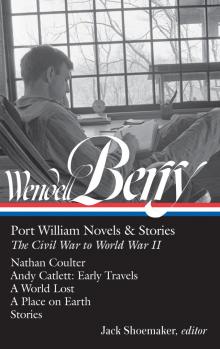 The Selected Poems of Wendell Berry
The Selected Poems of Wendell Berry Watch With Me
Watch With Me Bringing It to the Table: On Farming and Food
Bringing It to the Table: On Farming and Food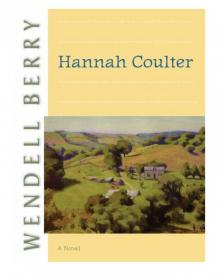 Hannah Coulter
Hannah Coulter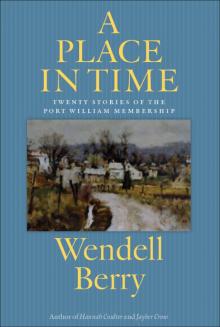 A Place in Time: Twenty Stories of the Port William Membership
A Place in Time: Twenty Stories of the Port William Membership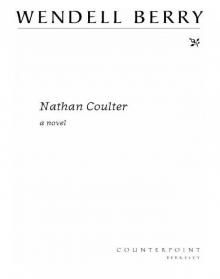 Nathan Coulter
Nathan Coulter Why I Am Not Going to Buy a Computer
Why I Am Not Going to Buy a Computer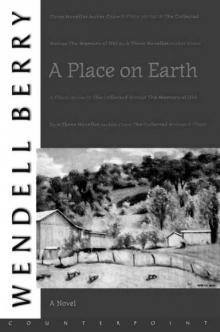 A Place on Earth
A Place on Earth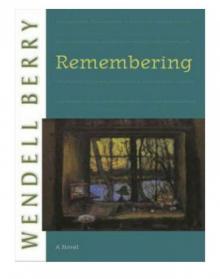 Remembering
Remembering New Collected Poems
New Collected Poems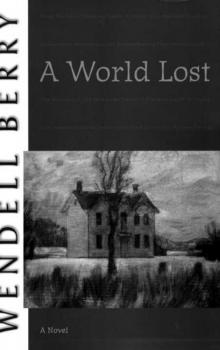 A World Lost
A World Lost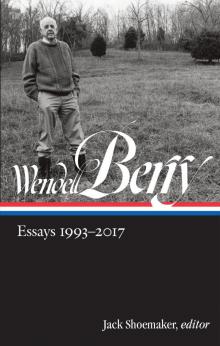 Wendell Berry
Wendell Berry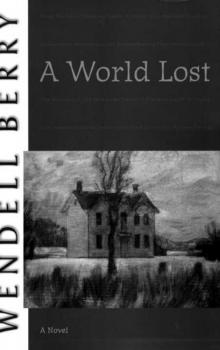 A World Lost: A Novel (Port William)
A World Lost: A Novel (Port William) Fidelity
Fidelity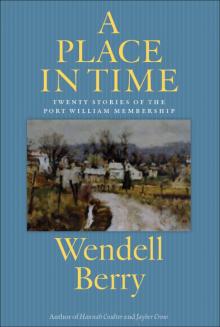 A Place in Time
A Place in Time